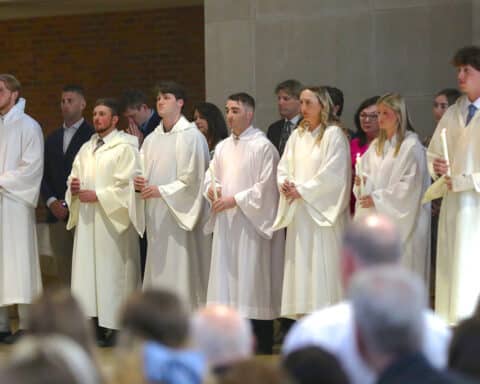It is a sad reality that Catholics sometimes get the impression that asking questions about their faith is a sign of faithlessness. Indeed, I knew one young woman who spent years bottling up her questions until she built up the courage to leave the Church. Only then did her questions come out into the open. And they were great questions! She would have made a good theologian. But the moment had passed. The courage and emotional energy it took to make her private loss of faith public meant that even good answers could no longer satisfy. There was no longer any foundation to build upon.
The Bible is absolutely full of questions: “Who sinned, this man or his parents, that he was born blind?” (Jn 9:2). “What must I do to inherit eternal life?” (Lk 18:18). “Has no one condemned you?” (Jn 8:10). “Why do you call me good?” (Mk 10:18). “Who do people say that the Son of Man is?” and its corollary “Who do you say that I am?” (Mt 16:13, 15). “Do you love me?” (Jn 21:16). And my personal favorite: “Who told you that you were naked?” (Gn 3:11).
In general, questions are good. Questions are how we seek the truth we were made for. We can see this in the never-ending stream of questions that pour forth from our 4-year-olds, and we can see it in the hundreds of pages of questions in the two Summas (Theologiae and Contra Gentiles) of St. Thomas Aquinas. The honest pursuit of truth is a beautiful thing, and questions are indispensable to that pursuit.
But we might have a little sympathy for those who are afraid of questions. For it is certainly the case that questions, the task of which is to pursue the truth, can be twisted so that they become tools for obscuring the truth.
When the big tobacco companies learned of the irrefutable connection between smoking and cancer, they hired a PR firm. That firm developed a very effective strategy. They knew they could not produce legitimate research to counter the inconvenient conclusion that smoking caused cancer. But they could ask questions that were designed to cast doubt on that research. Indeed, they have become known as the “merchants of doubt.”
This method of sly questioning that does not offer any plausible alternative explanation, but merely seeks to discredit, has gone mainstream and is regularly used by anyone who finds a particular scientific finding inconvenient. It has become the stock-in-trade of conspiracy theorists. While these folks protest that they are vilified for “just asking questions,” the fact is that not all questions are innocent. When the snake in the garden asked Eve, “Did God really say, ‘You shall not eat from any of the trees in the garden’?” (Gn 3:1), the goal was not truth, but its obfuscation.
Jesus is regularly faced with this dynamic in the Gospels. There are those who ask him questions, not to seek truth but to trap him. Jesus’s response to such questions is brilliant. He almost never gives them a direct answer. If someone, like the rich young man, asks Jesus an honest question, he gets a straight answer: “You are lacking in one thing. Go, sell what you have, and give to [the] poor” (Mk 10:21). But when the questioner is being dishonest, Jesus will often reply with a question of his own: “I shall ask you one question. Answer me, and I will tell you by what authority I do these things. Was John’s baptism of heavenly or of human origin? Answer me” (Mk 11:29-30). Or, “Show me a denarius; whose image and name does it bear?” (Lk 20:24). Or he might tell a pointed story that highlights the duplicity in the question: “A man fell victim to robbers as he went down from Jerusalem to Jericho …” (Lk 10:30).
Scripture is clear, then, that questions are good and necessary for seeking the truth and that we must be wary of dishonest questions. And, let me add, we should be wary not merely of others who might be asking dishonest questions — in which case Jesus’s practice of not giving a direct answer is highly instructive — but we should examine our own consciences to see if our own “just asking questions” is seeking truth or is merely an attempt to sow doubt.
I joked earlier that my favorite question in Scripture is “Who told you that you were naked?” But, in a more serious mood, I would have to say that Mary’s question to the angel Gabriel at the Annunciation — “How can this be, since I have no relations with a man?” (Lk 1:34) — is the most important one to me. Mary knows where babies come from. And so the news that she will bear a child is, at least, confusing. (St. Jerome, arguing for Mary’s perpetual virginity, points out that this question also does not make sense if Mary planned to have children once married. If she expected normal marital relations with Joseph, the announcement of a future child would not be so baffling. But I digress.)
Mary’s situation is not unlike so many that we face in our life of faith. We know, on the one hand, that God is trustworthy and his emissary — be that the angel Gabriel or the magisterium of the Church — speaks truly. On the other hand, just how what we are told can be true, given our own experiences and what we think we know about the world, is not always obvious. We can find ourselves, like Mary, trying to believe God, but not yet understanding what that means. There are some voices that would have us suppress our questions and doubts, afraid that any questions about matters of faith sow doubt.
But that is not the path that Mary shows us. Rather, she humbly and honestly asks her question. And when she does, Gabriel does not chastise her for her lack of faith. Rather, he patiently explains that, in her particular situation, the child will be conceived in an extraordinary way. Notice, however, that this is not the end of the story. Gabriel’s answer does not close the case, but simply clears the first hurdle to belief. Mary’s question is not simply a one-and-done. Rather, having understood that her pregnancy and child are utterly unique, Mary is introduced to a deeper mystery. Having understood a little, enough to take the next step, Mary’s relationship with her Son is something she “ponders in her heart” for years.
In this, as in so many things, Mary is the model disciple. Indeed, she is the model theologian. And her questioning and pondering is the New Testament foundation for the tradition of Christian theology. The Church has condemned fideism, the notion that we must simply believe without reference to reason. Catholicism, instead, invites honest questions as an essential way to grow in grace and truth. No one who loves the truth should be afraid of questions.
Brett Salkeld writes from Regina, Saskatchewan, Canada.





